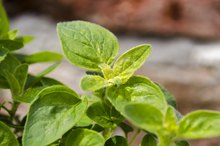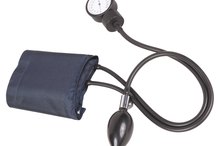What does fact checked mean?
At Healthfully, we strive to deliver objective content that is accurate and up-to-date. Our team periodically reviews articles in order to ensure content quality. The sources cited below consist of evidence from peer-reviewed journals, prominent medical organizations, academic associations, and government data.
The information contained on this site is for informational purposes only, and should not be used as a substitute for the advice of a professional health care provider. Please check with the appropriate physician regarding health questions and concerns. Although we strive to deliver accurate and up-to-date information, no guarantee to that effect is made.
How to Use Dried Ginseng Root
Ginseng has been used for thousands of years and is thought to improve mental alertness, memory and physical stamina and to increase a sense of general well-being. It has been used as an aphrodisiac, as a means to lower blood sugar levels and to control blood pressure. The list of purported benefits is extensive. American and Asian ginseng differ slightly from each other, and both are quite different from Siberian ginseng, which is classified in a different genus. The roots of American and Asian ginseng contains active components, called ginsenosides, which are thought to provide the herb's medicinal value, according to the University of Maryland Medical Center 1. An easy way to release the ginsenosides is to use dried ginseng root to prepare a simple tea.
Grind the ginseng root, coarsely, in an herb or coffee grinder to help release the active constituents in the root.
Lipton Green Tea Ingredients
Learn More
Place one teaspoon of the ground ginseng root into the tea infuser and seal the lid.
Bring two cups of water to a boil. Place the tea infuser with the ginseng root into the water and simmer it for around ten minutes to make a tea.
How to Make Cilantro Tea
Learn More
Remove the tea infuser and pour the tea into a cup. Sweeten the tea to taste. Drink up to two cups a day.
Related Articles
References
- University Of Maryland Medical Center: American Ginseng
- National Center for Complimentary and Alternative Medicine: Asian Ginseng
- "The Healing Herbs"; Michael Castleman; 1991
- Mancuso C, Santangelo R. Panax ginseng and Panax quinquefolius: From pharmacology to toxicology. Food Chem Toxicol. 2017;107(Pt A):362–372. doi:10.1016/j.fct.2017.07.019
- Arring NM, Millstine D, Marks LA, Nail LM. Ginseng as a treatment for fatigue: A systematic review. J Altern Complement Med. 2018;24(7):624–633. doi:10.1089/acm.2017.0361
- Barton DL, Soori GS, Bauer BA, et al. Pilot study of Panax quinquefolius (American ginseng) to improve cancer-related fatigue: a randomized, double-blind, dose-finding evaluation: NCCTG trial N03CA. Support Care Cancer. 2010;18(2):179–187. doi:10.1007/s00520-009-0642-2
- Best T, Clarke C, Nuzum N, Teo WP. Acute effects of combined Bacopa, American ginseng and whole coffee fruit on working memory and cerebral haemodynamic response of the prefrontal cortex: a double-blind, placebo-controlled study [published online ahead of print, 2019 Nov 18]. Nutr Neurosci. 2019;1–12. doi:10.1080/1028415X.2019.1690288
- Jenkins AL, Morgan LM, Bishop J, Jovanovski E, Jenkins DJA, Vuksan V. Co-administration of a konjac-based fibre blend and American ginseng (Panax quinquefolius L.) on glycaemic control and serum lipids in type 2 diabetes: a randomized controlled, cross-over clinical trial. Eur J Nutr. 2018;57(6):2217–2225. doi:10.1007/s00394-017-1496-x
- Mousa HA. Prevention and treatment of influenza, influenza-like illness, and common cold by herbal, complementary, and natural therapies. J Evid Based Complementary Altern Med. 2017;22(1):166–174. doi:10.1177/2156587216641831
- Seida JK, Durec T, Kuhle S. North American (Panax quinquefolius) and Asian Ginseng (Panax ginseng) preparations for prevention of the common cold in healthy adults: A systematic review. Evid Based Complement Alternat Med. 2011;2011:282151. doi:10.1093/ecam/nep068
- PennState Hershey: Milton S. Hershey Medical Center. American ginseng. Updated April 27, 2016.
Writer Bio
In Jacksonville, Fla., Frank Whittemore is a content strategist with over a decade of experience as a hospital corpsman in the U.S. Navy and a licensed paramedic. He has over 15 years experience writing for several Fortune 500 companies. Whittemore writes on topics in medicine, nature, science, technology, the arts, cuisine, travel and sports.









